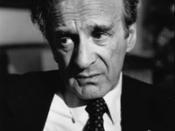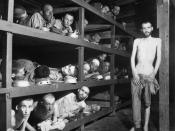Alexander Liu
Inq. Writing 100
24 September 2007
Hatred or Pity?
After Nazis tormented Elie Wiesel, is it possible he still felt sorry for them? Throughout Night, Wiesel's autobiography, he wavered between feelings of hatred and pity for these tormentors. Wiesel originally thinks the Nazis' gathering and transferring of his fellow Jews in innocent. However, after he finds out their true intentions and experiences the atrocities they were committing firsthand, he still maintains mixed feelings.
Night, written by Elie Wiesel, is a true story based on his own life experiences throughout the Holocaust. Elie was almost thirteen when World War II began, and shortly after he was transferred to Auschwitz concentration camp. After being separated from his mother and sisters, he was again transferred this time to Buna. He experienced many life changing events here and realized the truth about the war and the Nazis' genocide campaign. After staying there only a couple months, he was again relocated to Gleiweiz, but this time by foot.
They were forced to run twenty kilometers during the unbearable cold winter. Staying there for only three days, they were finally transferred to Buchenwald. The journey there was again a gruesome one. Around on hundred people were packed into a roofless cattle car; only twelve people got off alive. Two of the lucky survivors were Elie and his father. Upon arriving at Buchenwald, Elie's father was in a bad state. Elie spent his time here carrying for his father, fetching him water and food. Shortly thereafter, Elie's father passed away. Only four months later, on April 11, 1945, the Americans liberated everyone at the concentration camp.
So, how could Wiesel possibly have sympathy toward the Nazis? At the beginning of the book, Wiesel felt indifferent when they first invaded his hometown. The Nazis were...


